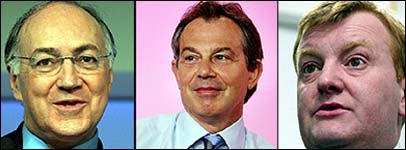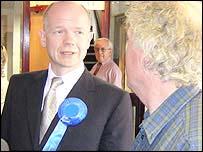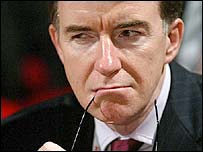Navigation
Hair Loss News Archives
April 2005
Bald truth about attracting voters
April 2005

Which leader is hair apparent?
Tony Blair might believe that a strong economy and record investment in public services are helping Labour to sustain a healthy lead in the opinion polls.
But it might just be that hitherto unconsidered factors are giving him a boost.Some believe the fact that he has a fuller head of hair than his Conservative counterpart may tip a few floating voters mulling over the merits of Labour and the Tories his way.
This might seem trivial nonsense - but there is research to back the theory that these things matter.
Research from the early 1990s found that the proportion of bald men making it to elected office in the US was four times less than the number of follicularly challenged males in the population at large.
Hair factor
A quick survey of recent general elections in the UK reveals a similar story on this side of the pond: John Major may have been grey, but he had far too much hair for Neil Kinnock, and William Hague had youth, but not flowing locks on his side when he took on Tony Blair in 2001.
The last time a bald politician was elected to Number 10 was Winston Churchill in 1951 - and he was up against the equally receded Clement Attlee.

William Hague: Maybe he should have kept the
baseball cap on
|
Not that all hair is a good thing. The last prime minister to sport a moustache was Harold Macmillan in the early 1960s, and the last bearded occupant of Number 10 was David Lloyd George, who left office in 1922.
New Labour got wise to the importance of such trivialities before their resounding victory at the 1997 election.
The party's image guru Barbara Follett ordered a cull of facial hair which included Alistair Darling, Geoff Hoon and Peter Mandelson among its victims.
Jonathan Maitland, a journalist and presenter, examines what makes politicians attractive to the electorate in his book, 'Vote for....Who?'.
He believes that as the policies of the major parties have converged in recent years, then the image of their leaders has become more and more important.
"Forget health, education and transport, and think hair, elocution and teeth," he said.
"Because there is so little difference between the policies of the major parties, some people are bound to go with their instinctive reaction to the leaders.
"Polls have been done, and it is clear that of the 800,000 crucial swing voters, 60% say the most important thing for them is image."
Grooming important
Leonie Roberts, of the Federation of Image Consultants, agrees that the way a politician looks is more important than perhaps it should be.

Peter Mandelson post tache removal
|
The key, she believes is for aspiring leaders to look as though they take a pride in their appearance - and not to chop and change their image.
"Grooming is absolutely essential. Anybody who looks sweaty, smelly or unkempt is an absolute no-no," she said.
"It's also important for politicians to have a constant brand, as it helps to breed trust."
Ms Roberts agrees that baldness can trigger a powerful reaction.
It can make people seem older than they are, she says, and is associated by some, possibly subconsciously, with illness.
Historically, it has even been interpreted as a sign of an ancestral curse.
However, on a more positive note, she points out that baldness is also associated with virility, truth and wisdom.
Statesmanship
Maitland says that image is more complex than mere physical attributes.
He believes it is vital for any aspiring prime minister to radiate a quality of statesmanship.
If a politician doesn't have this, then they can forget ever achieving the highest office.
For Maitland, the classic case was Michael Foot, trounced in the polls in the 1983 election.
"He appeared at the Service of Remembrance at the Cenotaph looking like a scarecrow who had just had a fight with a threshing machine," he said.
"If it wasn't already over by then, it certainly was after that.
"It is sad, but inevitable, but often it just comes down to whether the voters like the cut of one's jib."
